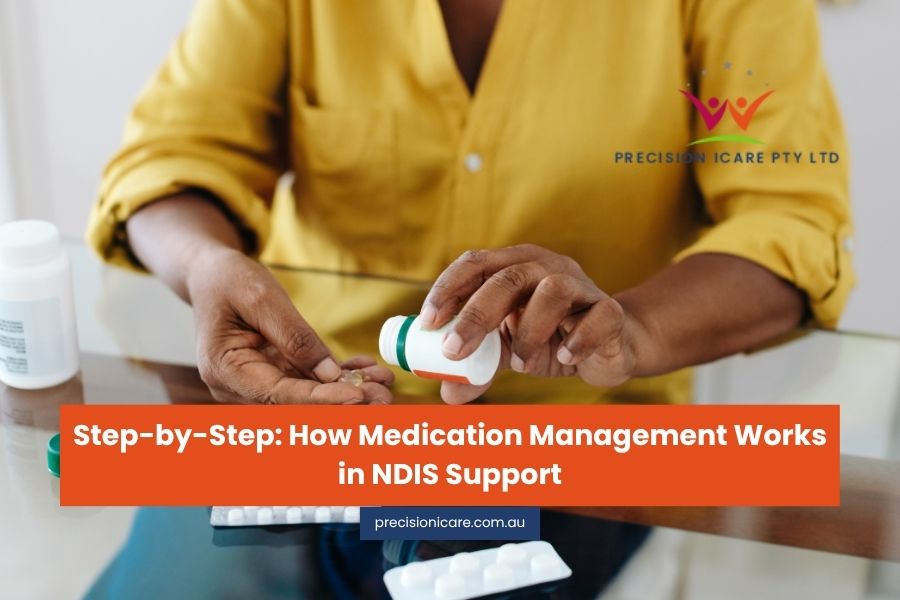Many NDIS participants may find it hard to manage medication. Accuracy and carefulness are required in order to take the right doses at the right time. The NDIS medication management support process aims at ensuring that participants ensure their health, safety, and independence as well as minimising stress among their families and carers. Why Medication …
Many NDIS participants may find it hard to manage medication. Accuracy and carefulness are required in order to take the right doses at the right time. The NDIS medication management support process aims at ensuring that participants ensure their health, safety, and independence as well as minimising stress among their families and carers.
Why Medication Management Matters in NDIS Support
Medication administration is a very vital aspect of the daily life of most of the disabled. Incorrect use of medications may cause severe health conditions, hospitalization, or a lower quality of life.
Structured support of NDIS participants could be of benefit in a few ways:
- Safety: Guarantees the appropriate medication at the right time.
- Independence: The participants will have the ability to have power over their health.
- Peace of Mind: The carers and the families are certain about the assistance of their loved ones.
- Compliance: Adequate documentation allows the participants to adhere to prescriptions correctly.
The NDIS medication management with professional assistance will ensure that the participants are healthy, safe, and independent.
Step 1: Assessment and Planning
The initial one is to verify medication requirements. A nurse/support coordinator creates a list of medicines, dosage, and time. They observe allergies and side effects. They also determine whether the participant is able to administer some medicines independently or whether he/she requires full assistance.
A personal plan is made from this assessment. It guides all future medication support. The plan ensures medicines are given correctly, and everyone involved knows their role. Planning helps prevent mistakes and keeps participants safe.
Step 2: Who is Involved
A small team works together for safe medicine use. The NDIS support coordinator manages the plan. Nurses or carers give medicines safely. Families may help supervise or guide participants.
Participants are encouraged to take part, too. Learning to take some medicines builds confidence. Clear communication between everyone reduces mistakes and creates a safe environment.
Step 3: Preparing Medications
Then, the medicines are ready to take on a daily basis. Nurses can also use blister packs or labelled containers. This facilitates easy knowledge of what medicine to take and when. Preparation aids the participants and carers to adhere to the plan in a safe way.
Proper organisation also prevents missed doses or confusion. It allows quick checking and keeps the process simple. Participants can take medicines consistently with less stress.
Step 4: Giving Medications
The primary step is the administration of medicines in a safe manner. Staff adhere to the plan and administer the correct dose during the correct time. They test allergies or reactions and document any side effects.
Trained staff are important when participants take many medicines. They make sure medicines are taken correctly and consistently. Regular support also helps monitor changes in health.
Step 5: Monitoring and Recording
After taking medicine, staff watch participants carefully. They check if medicines were taken correctly and look for side effects. Records are kept shared with families, carers, and doctors.
It is useful to monitor the problems that occur at an early stage. Detailed records enable alterations of the plan in case of necessity. Documentation keeps all people safe and controls the process of managing medicines.
Step 6: Reviewing the Plan
Medication needs can change. Plans are reviewed regularly by nurses, coordinators, and families. Doses can be updated or medicines stopped if not needed. This keeps participants safe and healthy.
Reviews also support independence. Participants may learn to take more medicines themselves safely. Regular updates make sure medication management matches the participant’s needs over time.
How to Prepare for Medication Management Support
There are some measures that can be taken by participants and families in preparation of NDIS medication support:
- Maintain a list of all medications, dosages, and schedules.
- Record allergies, previous reactions, or side effects.
- Determine individual objectives of managing medication independently.
- Make drugs and storage spots readily accessible.
Preparation ensures a smooth start and reduces the risk of errors during daily administration.
Key Questions to Ask Your NDIS Support Team
The participants and families should enquire: When it comes to medication management, they should ask:
- Who am I supposed to give me medicine?
- What are the ways of organising and monitoring doses?
- What do you do for side effects or missed doses?
- Is it possible to engage in education about self-management of medications?
- The frequency of the plan review and revision?
The key to guaranteed understanding of the process and feeling confident of the support is to ask the right questions.
Benefits of Professional Medication Management in NDIS
NDIS participants receive several benefits from professional medication management:
- Safety and Accuracy: Reduction of the risk of mistakes and health complications.
- Consistency: This provides consistent support even in periods when the family carers are out of town or during travel.
- Independence: The participants are taught how to safely use their medications.
- Peace of Mind: Families and carers are confident that professionals are necessary.
Professional support increases health outcomes and general quality of life.
Final Thoughts
Medication management under NDIS keeps participants safe, independent, and confident. With planning, preparation, administration, monitoring, and review, medicines are taken correctly every day.
Trained staff at Precision I Care help participants manage medicines effectively. This support promotes independence and health. NDIS medication management services from Precision I Care make daily life easier and safer for participants and their families.
Book a Consultation
It’s easy and free!







